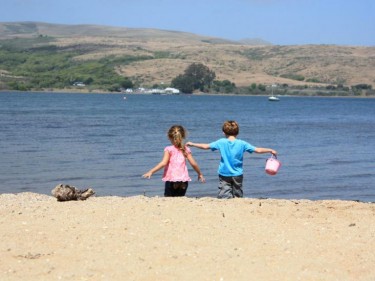The Importance of Imaginitive Play
 My husband e-mailed me a link to a story he heard on NPR's Morning Edition yesterday morning while driving in to work. It was something of particular interest to me, a story about the importance of imaginitive play in the lives of children, and how it greatly affects their development and behavior. It's an interesting take on the role of toys, especially specific toys such as those tied into TV shows and movies, and the commercialization of children's play (marked by the debut of the Mickey Mouse Club in 1955 and its associated toy advertising).
My husband e-mailed me a link to a story he heard on NPR's Morning Edition yesterday morning while driving in to work. It was something of particular interest to me, a story about the importance of imaginitive play in the lives of children, and how it greatly affects their development and behavior. It's an interesting take on the role of toys, especially specific toys such as those tied into TV shows and movies, and the commercialization of children's play (marked by the debut of the Mickey Mouse Club in 1955 and its associated toy advertising).
Earlier play, say from the 19th century to the mid 1950s, focused more on imagination, activity, and role-playing, not playing with toys as we know it know. As Brown University cultural historian Howard Chudacoff says in the story "Essentially, instead of playing pirate with a tree branch they played Star Wars with a toy light saber." Other factors, such as the overregulation of children's lives with organized activities, sports, and other things with "rules" are covered, too.
This Christmas, we really made a conscious effort to get our children "open ended" toys to help foster imaginative play. Something like a Dora the Explorer playset is pretty much only ever a Dora the Explorer playset, but a set of wooden blocks, or even Legos, while not as flashy or trendy, can really be anything the kids want them to be.
I won't repear the entire piece here. The story is really worth your time. You can either listen to it or read a transcript on NPR.org: Old-Fashioned Play Builds Serious Skills.
You can also submit your questions about kids and play via the website, and Adele Diamond, a professor of developmental cognitive neuroscience at the University of British Columbia, will answer selected questions. Responses will be posted on Thursday, February 28.






Comments
This is so important!
Posted by funfelt on
Thank you so much for posting this! This is something I've been trying to get across for years, parents and teachers are micro-managing kids out of creativity and imagination but more importantly, self-discipline. It is nice to see that "studies" can back me up now! :) I passed it along to my mother's club and other groups I belong to. Thanks so much for sharing it!
Karen Clark, Mom to three who are 13, 10, and 4
http://www.karen-clark.com